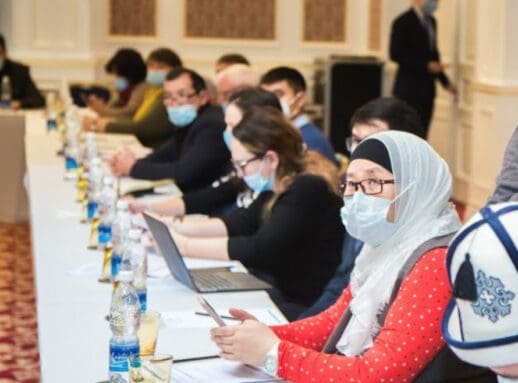
Supporting the Kyrgyz Government on Developing the Concept of the State Policy of the Kyrgyz Republic in the Religious Sphere launched in July 2020 in partnership with the Research Center for Religious Studies (RCRS). It is an eleven-month rapid response project that aims to support the promotion of religious freedoms in the Kyrgyz Republic. The specific objective is to support the working group under the State Commission on Religious Affairs (SCRA) of the Kyrgyz Republic on developing evidence-based and inclusive Concept of the State Policy of the Kyrgyz Republic on Religious Sphere for 2021-2026.
Context
The SCRA implemented The Concept of the State Policy of the Kyrgyz Republic on Religious Sphere for 2014-2020 during the last seven years. In 2020 as this policy ended, the SCRA established a working group to draft the new Concept of State Policy of the Kyrgyz Republic on Religious Sphere for 2021-2026 (the Concept) for presentation to the Office of the President. This project was designed to support this process to ensure the policy was inclusive, supportive of religious freedoms, and in line with international standards for such state policies. Through a nine-month rapid response initiative, Search, in partnership with RCRS, leveraged existing partnerships and networks to support the SCRA’s development of the Concept, provide technical support and expertise, and organize inclusive dialogue platforms and public discussions.
Search played a meaningful role in encouraging progressive developments in regard to the Concept in Kyrgyzstan through consistent and inclusive outreach and dialogue throughout the drafting process. Search’s strategies leverage our extensive in-country and regional experience to engage diverse stakeholders in shaping national approaches to religious freedom in the country, including on laws and formal policies.
Search’s activities supported
development of the Concept
The following set of activities were implemented to support the project objective guided by the fundamental idea that the development of impactful and inclusive progressive policies requires the active engagement and participation of technical experts, government stakeholders, CSOs, and diverse public stakeholders throughout the policy development and implementation process. In regard to the Concept, Search supported the development of the Concept by providing technical and facilitating public outreach support as the State Commission led the process to draft the new Concept.
Technical Support
Search provided both expert and technical support to the members of the working group on developing the 2021-2026 Concept. Two local experts with state-religion experience were hired to join the working group and participate in public hearing sessions across the country, as well as the two National Consultative Working Group meetings. These meetings included stakeholders from academia, civil society, government to inform relevant state institutions, experts, and civil society organizations on the key discussions and outcomes from the public hearings integrated into the 2021-2026 Concept draft. Stakeholder feedback primarily focused on issues such as religion and education, the role of media, and the improvement of legislation language in relation to the religious sphere applied to the Concept.
Public Input and Engagement
Search facilitated public hearings to serve as an open forum for local administration, civil sector representatives, and religious experts to engage in dialogue on critical issues such as the creation of local committees for the resolution of religious issues and the terminology used in the Concept. The public hearings were essential to supporting local ownership and development of the Concept, ensuring that the policy was responsive to their concerns and priorities. Search also held press conferences to inform the public on the implementation and messaging of the Concept in addition to its key goals and the subsequent action plan to achieve them. Search will also disseminate Kyrgyz and Russian copies of the 2021-2026 Concept and Action Plan among state institutions, local authorities, and civil society organizations to further support increased public awareness.


